The human body's approximately 100 trillion cells, as well as its bones, respiratory system, glands, organs, tissues, and every other element, belong to Allah, Who placed proofs in the human body and the universe so that people will come to know and recognize Him. As we said in the last chapter, we see Allah's mercy toward human beings while they are still in their mother's womb: "… then made him [or her] a drop in a secure receptacle" (Surat al-Muminun, 13). Everything that happens in this process of human development is a wondrous manifestation of His name the All-Merciful and Most Merciful. During a person's life, the same functions continue. Each cellular change, breath, glance, perception, understanding, mental activity, eating, digestion, growth, and everything else that happens in one's body is controlled by Allah, Who wills it to happen. A person's shape, intelligence, and spiritual and physical faculties are all proofs of His great mercy. The Lord tells us of this reality in the Qur'an:
If you tried to number Allah's blessings, you could never count them. Allah is Ever-Forgiving, Most Merciful. (Surat an-Nahl, 18)
In this chapter, we consider the wonderful functioning of some human organs, the extraordinary systems required to sustain life, and some of the bodily functions in the hope that readers will realize that only Allah's endless mercy sustains their lives. It must not be forgotten that everything we will sum up in the following paragraphs happens by the endless power and might of our Lord, the only Ruler of the universe. No human being can ever have any influence over the functioning of any of these things.
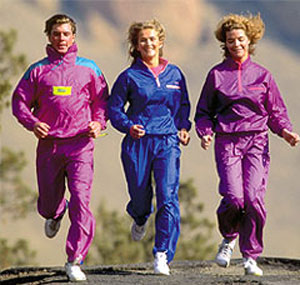
The 100 trillion cells act as if they knew each other. They carry out their special functions without any negligence or laxity. In this perfect coordination, hormones (messenger cells) relay commands that cause physical growth, reproduction, the body's inner balance, the coordination of the nervous system, and many other functions to occur. Allah created these incomparable systems and directs it through cells and hormones without your knowledge and fully out of your power to control. For example, you have nothing to say about how this system functions: you cannot make your height longer, or command your cells to divide, multiply, and make you taller, for all of these have been determined by Allah and cannot be altered. This control is a grace from Allah, for exercising such continual control is beyond any person's ability. A person could never control his own body even if he had to. Or if a human being had such control, human life could never possibly survive. But, in his infinite kindness, Allah creates every cell in the human body and in everything in the world perfectly at the same moment and sustains them all under his control. Thus, we should understand that Allah's mercy encompasses everyone and everything and acknowledge His power.
People do not have to worry or even think about their vital functions while sleeping, for Allah keeps them working perfectly. Indeed, Allah's mercy causes each bodily system to perform its functions silently while sleeping. We never have to worry that one will stop functioning, such as our lungs forgetting to breath.
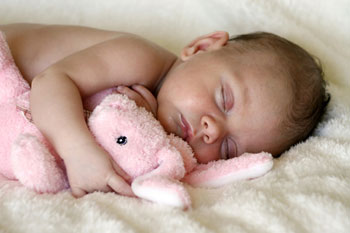
Allah created night so that people could rest.
Capillary vessels carry oxygen, energy, nutrients, hormones, and other materials to every cell. The 5 billion capillary vessels have a total length of 950 kilometers (590 miles). If a person put 10,000 of the smallest capillary vessels side by side, the total thickness would be roughly equivalent to a piece of pencil lead. Blood can move in these narrow vessels, without getting clogged or slowing down, because of water's high fluidity. Michael Denton, a noted molecular biologist, says: "A capillary system will work only if the fluid being pumped through its constituent tubes has a very low viscosity. A low viscosity is essential because flow is inversely proportional to the viscosity... From this it is easy to see that if the viscosity of water had a value only a few times greater than it is, pumping blood through a capillary bed would require enormous pressure and almost any sort of circulatory system would be unworkable... If the viscosity of water had been slightly greater and the smallest functional capillaries had been 10 microns in diameter instead of 3, then the capillaries would have to occupy virtually all of the muscle tissue to provide an effective supply of oxygen and glucose. Obviously the design of macroscopic life forms would be impossible or enormously constrained ... It seems, then, the viscosity of water must be very close to what it is if water is to be a fit medium for life" (Michael Denton, Nature's Destiny [Free Press: 1998), 35-36.) In other words, the fluid's fluidity is also ideal for sustaining life. And, Allah created the fluid with these millions of different fluidities and regulates each one of them as exactly as required.
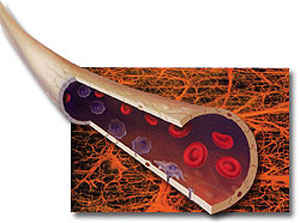
Water's fluidity allows blood cells to circulate even in tiny blood vessels.
The eye, apart from its front part, is spherical in shape. Its outer surface, a hard resilient stratum with a full white color (the white of the eye), is visible and surrounds the center's colored part. If the white of the eye had a soft, gelatinous consistency, it could not protect the eye effectively. But because it is hard, it can easily rid the eye of such harmful foreign matter as dust with the help of tears. The hard, resilient tissue covering the eye changes at the cornea, which it is composed of a transparent stratum that allows light to pass through it. Despite the fact that the cornea and the white of the eye both form continuity, their structures are totally different and separated by a distinct boundary. The white of the eye can be compared to the hard granite covering the front of a building; the transparent cornea can be compared to the building's windows. If the cornea's thin tissue covered the whole eye, it would be totally defenseless against external influences, powerless, and blind. If the hard, white tissue that forms the white of the eye extended over the front transparent stratum of the eye, light could not reach the lens and so people could not see. But Allah arranges all of these things perfectly to display His incomparable artistry.
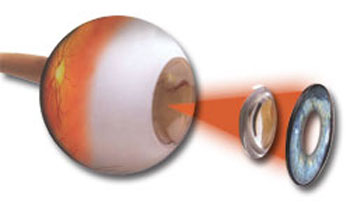
The eye has a wonderful creation that modern technology cannot reproduce.
The cornea must always be transparent and sensitive in order to see objects clearly. But when this transparency is lost, one's vision becomes blurred due to insufficient light. The stratum open to the outside is very sensitive; it can notice the smallest speck of dust that flies into the eye and get rid of it. The cornea is transparent because its fibers are arranged in a delicate order. Any interference with this order will cause the cornea to grow dark and one's vision to blur. The cornea is just as important as a camera lens; it is so clear that it can only be seen when looked at carefully from close up. One of the body's most delicate structures, its surface is composed of invisible nerves and lymphatic vessels that do not interfere with vision. But these do not interfere with vision. These nerves react to the slightest touch, and their reflexes summon such protective mechanisms as the eyelid to assist. The eyelid immediately ejects anything adhering to the cornea, and closing it protects the cornea from other dangers. In one sense, the cornea is like a window behind which the eye works. A grain of sand can scratch it; however, if it is scratched or damaged, it can repair itself rapidly. Thus, people do not have to go through life with blurry vision, as if staring through a hazy curtain. The facts that a living piece of tissue of fibers and blood vessels is as clear and transparent as glass, and that it can make such a difference in our life, are proofs of Allah's wonderful creation.
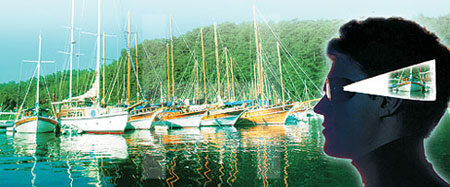
Our eyes present the world to us. These gifts, which Allah bestowed upon us as blessings make it possible for us to see colors and vivid images.
All of the cells that form this thin, transparent, and delicate living membrane in the eye; that form hard bones and the tissue of the intestines; and those belonging to the blood came about due to the division and multiplication of one cell. As the result of the division of the same cell, rock-hard bones and the cornea as transparent as glass were formed. These cells, all of which are formed from lifeless, unconscious atoms, cannot decide to create such things or design the necessary plans. Allah orders them to do what they do, what organ they form, and what functions they perform.
By the time you finish reading this sentence, your eyes will have performed about 100,000,000 functions. It may be hard to believe, but you have two of the world's most magnificent instruments. Humanity has never been able to produce the like. Your eyes give meaning to whatever you see: family, friends, home, work, and so on. Without them, you could not know the outside world, imagined colors, shapes, views, people's faces, or understand the concept of beauty.
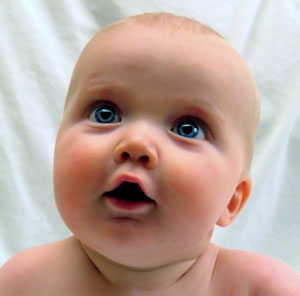
Eyelids and eyelashes protect the eye from all kinds of external influences.
Even more amazing, all you have to do to see something is just look at it. It is as simple as that. You do not order your eyes, or the organelles, the nerves connecting the eyes to the brain, and then the brain to Look and see. You only have to look to see. In order to see an object clearly, you cannot calculate the optical measurement of the radius that your eye's lens needs to make according to its distance from the object, or the delicate proportions of the contraction of the muscles attached to the lens. Many people do not realize what a great miracle this is. But believers know that vision is a wonderful gift from Allah.
The eye is a complex structure that occupies a very small space. Just as valuable jewels are protected in a case, so are our eyes protected against external influences. In proportion to their importance, they are protected because of their superior creation. The eyes rest on a protective cushion of oil connecting the lower bone protrusion with the skull, within sockets surrounded by special tissues. They are protected from external trauma by the nose bone, muscles, and the cheek bones, also known as the eye cavity.
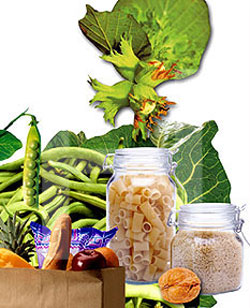
Their location is ideal for providing the best vision. For example, their position allows us to control and manage our bodies and limbs in the best possible way and, moreover, ensures their health and security. With a small quick movement of the neck, the eyes ensure that a person does not come into contact with any object that could cause injury. The best location for the eyes is on the face. For example, if they were located under the nose they would not be so secure, would present an esthetically discomforting sight, and limit a person's vision. From all points of view, the eyes are in their ideal place, symmetrical, and esthetically pleasant. The space between them is about the size of one eye. If this proportion were wider or narrower, the whole expression of the face would change. The eye, with all of its characteristics, is proof that human beings were created by Allah. This resulting harmony, symmetry, and esthetical appearance are blessings from Him.
Allah tells human beings about these blessings and wills us to be thankful:
Then [He] formed it [a human body], breathed His Spirit into it, and gave you hearing, sight, and hearts. What little thanks you show! (Surat as-Sajda, 9)
The eyes, the body's windows, look out on the external world. They are protected and maintained by a special system. One of this system's most important parts is the eyelids, which protect the eyes and ensure that the conjunctiva and the cornea are always covered with a certain amount of fluid. The vessels of the conjunctiva, a stratum located on the inside of the eyelids, nourish the eye's outer layer, which receives no oxygen during sleep. The eyelid's skin is very thin, compared to other parts of the body, and can completely and tightly cover the eye socket when necessary. This skin's lower layer contains no oil, is very loose, and blood can collect in it. If it were thin and oily, opening and closing the eyes would be very difficult. Every day, a person's eyes blink thousands of times. This involuntary and automatic movement, which most people do not pay much – if any – attention to, protects the eyes from contact with intense sunlight and foreign matter. The fact this movement is automatic is a blessing that most people are not aware of. If this cleansing were not automatic, blinking would only remind people that some material needed to be removed from their eyes so that it would not be infected by germs and that they could see clearly. As a result, blinking would be a bother and a person would have to concentrate so as not to forget to blink. This would be a great problem, especially during sleep, as the eyes would dry out if people forgot to blink.
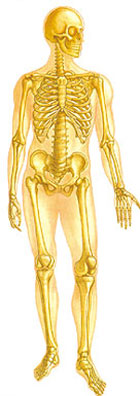
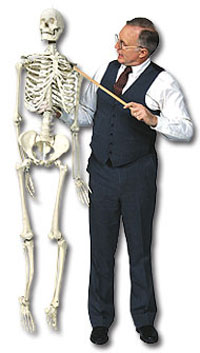
The skeletal system is an example of the flawless creation with which Allah created every aspect of the human body. The skeleton bears an enormous weight every time we take a step, and yet none of the bones are adversely affected by this.
The eyelids, located on the eye's curved surface, are in full contact with the eye's front section as they open and close. If this were not the case, it would be impossible to keep the opening clean and free of foreign matter. An oily secretion from a gland within the eyelids prevents them from sticking together when opening and closing, and facilitates their sliding over the eyes. Such precision shows the protection of the All-Merciful and Most Merciful over us. The eyelid is a grace from Allah, one of countless clear examples of His mercy and compassion. If the eyelids did not close during sleep, sleeping would be very difficult. A dark room would be needed, and a person would not be able to sleep during the day. Moreover, during sleep the eyes would remain open and thus defenseless before every external influence.
If the eyelids did not close during sleep, sleeping would be very difficult. A dark room would be needed, and a person would not be able to sleep during the day. Moreover, during sleep the eyes would remain open and thus defenseless before every external influence.
If eyelids did not exist, people would go blind very quickly. The cornea, the eye's top layer, would dry up and cease functioning. The least bit of dust entering the eye would gradually cause major problems, and the eye would be attacked by germs, defenseless against any trauma, and in constant danger of becoming blind. For example, people suffering from lagophthalmia, an illness that prevents the eyelids from completely closing or closing in the normal manner, find themselves faced with the danger that the cornea cannot be lubricated, and infections may arise due to drying. If this illness persists for a long time, the eye can be permanently damaged.
Human reflexes are defined as rapid involuntary reactions to external warnings. This reflex mechanism moves the eyelids at the appropriate time and wards off danger. Something that touches the cornea, the eyelashes, the area between the eyes, or the forehead may cause a reflex that warns the eyelids. If we examine the network of nerves that produce blinking, we see just how subtle this nerve network really is. To produce each of the reflexes described above, warnings must be carried to the eyelid by different paths and proceed to the brain, where they are evaluated. Nerve stimuli are then sent to the relevant muscles.
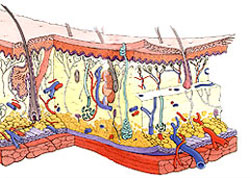
Even if a small section of the skin is damaged, the whole body can be adversely affected. If the damage is extensive, the body may lose water and soon die. Allah gives the skin protective qualities in His great mercy, creates everything perfectly.
In this process, the nerve stimuli reach the brain directly within one one-thousandth of a second. Thus, the eyelid closes at just the right time to protect the eye from the foreign matter or to clean it. This process of recognizing danger and sending various reflexes as signals along separate nerve paths without any confusion is extremely complicated. Human beings, who are surrounded by constantly changing conditions, must know what is going on around them. For this reason, blinking is such a quick action that it does not endanger the person in any way, which is truly a great blessing. It would be very dangerous if blinking lasted a long time. At a moment when a person was engaged in blinking, perhaps he might not notice a truck coming at him and be able to escape. The eye—a human being's window on the outside world—is protected in all these ways; it is an example of the blessings of Allah in this world.
Most people think of tears as just salty water. However, in reality they are composed of a very special fluid whose components differ according to their various functions. The tears' first duty is to protect the eyes from germs. Lysozyme, an enzyme found in tears, destroys many kinds of bacteria and germs and thus protects the eyes from infection. This material is more effective than the powerful disinfectants used to clean buildings from germs. And yet it does not harm the eyes, for Allah created it to be in perfect harmony with the eye's chemical structure. No other disinfectant of such power can be used in the eyes, and no artificial disinfectant can replace human tears.
Tears are produced according to very delicate measurements that provide the right amounts to protect the cornea from drying out and the eyeball from losing its lubrication. Thus, the eye can move comfortably, for no discomfort is produced when the inside of the eyelid moves against the eye's surface. If some foreign matter enters the eye, tear production increases automatically, the presence of more lysozyme acts as an antiseptic, and the increased amount of fluid ejects it. If sufficient tears were not produced, the resulting (and constant) friction between the eye and the eyelid whenever our eyes moved would torment us. We can get an idea of this when eyes, for whatever reason, cannot produce tears: The person always feels a burning sensation in his or her eyes, which swell, get red and, in advanced states, may destroy the person's eyes.
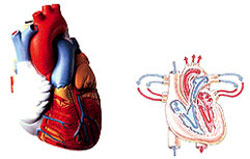
Every detail relative to the heart has an incomparablecreation.
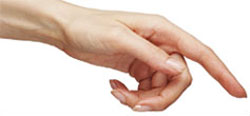
Our hands can lift a heavy object and pick up a needle because of their perfect creation.
Eyelashes protect the eye from dust and foreign matter. If they are plucked or cut off, they grow again. When they reach their former length, they cease to grow. Eyelashes are smooth, soft, and curl upwards.
Their curved and elastic form occurs with the help of a greasy secretion from the sebaceous glands, known as the glands of Zeis, inside the eyelids. If this were not the case, one's eyelashes would be like a brush, and every blink would engender an uncomfortable sticking feeling. Our eyebrows prevent sweat from dripping into our eyes, break up the Sun's rays, and prevent them from shining in our eyes. Besides this, they complete the esthetic appearance of a person's eyes, for Allah has created human beings to be beautiful in every detail.
In addition to tears, the eye has a lubrication system. The eyes move in every direction about one hundred thousand times a day, and this system protects them from becoming worn out. This constant lubrication which produces no discomfort when the eyes move, protects the eyes from the effects of friction and foreign matter. If a serious problem arose with the conjunctiva and lubrication could not occur, every movement of the eye would cause unendurable pain. However, thanks to this flawless system, a healthy person never experiences such discomfort.
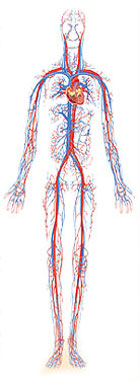
An adult's heart pumps about 340 liters (12,000 ounces) of blood during sleep. At this speed, a car's gasoline tank could be filled within 7 minutes.
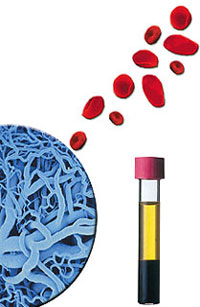
Plasma makes up 55 percent of the blood. Its qualities and the material it carries make it a vital substance for the human body. Many things, from transporting nutrients and waste to controlling blood pressure, are connected with its properties and its ability to move throughout the body.
Our five senses have been created to meet our needs. For example, our ears hear sound waves only between certain limits. At first, it might appear advantageous to hear a wide range of sound waves, but this limit of perception (the sound threshold), has been set for a particular purpose. If we had more sensitive ears, we would hear all sorts of sounds, from our heart beats to the rustling of microscopic bugs in the ground. This would make us very uncomfortable. The flawless creation in our ears and our hearing is a gracious gift from Allah. In this regard, the Lord says in the Qur'an: "He has created hearing, sight, and hearts for you. What little thanks you show. " (Surat al-Muminun, 78)
When you eat, your digestive system starts working. The teeth, which have been specially created to tear and grind the food, are covered with enamel, the hardest known organic material, and are highly resistant to chemical substances. Every tooth is shaped to suit its function. For example, ten sharp teeth cut the food, the canine teeth are pointed to tear the food into pieces, and the molars are designed to grind the food. If our teeth were all the same shape, eating would be impossible. Moreover, each tooth is in its proper place: The incisors are in the front the molars are in the back. No other arrangement would be suitable. The upper and lower teeth are independent of one another, yet enjoy a relationship of perfect harmony. They are designed to press against one another when the mouth is closed. For example, if one molar were longer than the other teeth or if it protruded too much, you could not close your mouth or speak and eat as you do now.
Food is both ground by the teeth and attacked by chemicals found in one's saliva. No one really pays attention to their saliva, whether it is being secreted or not, or in what amount. But saliva, usually considered a simple secretion, is actually a special balance of various chemicals. First of all, it allows us to taste our food by recognizing the food molecules that give food its taste. Only when these combine with the tongue's taste-sensing nerve endings can we taste food. This is also why we cannot taste food when our mouth is dry. The mouth secretes two kinds of saliva. One of them decomposes carbohydrates and changes them partly into sugar. For example, bread is a carbohydrate. If you put a piece of bread in your mouth and wait for a moment without chewing, you will sense the taste of sugar on your tongue from the decomposing carbohydrates. The other kind of saliva has a dense sticky consistency that causes whatever you eat come together in a shape like a piece of syrupy cake so that you can swallow it. Without saliva, we could not swallow, taste our food, talk comfortably, or eat solid food. This would be a very difficult situation for us.

Saliva secreted from three different glands enables us to swallow our food easily and its chemical components breaks this food down into useful parts. Our mouths work like a chemistry laboratory that breaks down the starch in our food. Salivary amylase, an enzyme found in saliva that is specially produced for this work, breaks down starch and converts it into sugar. This process of digestion that happens in the mouth is chemical and mechanical (viz., the teeth), two distinct kinds of digestion that complement each other.
The tongue plays an important part in grinding the food, for it is very sensitive to taste and allows chewed food to pass easily through the throat. On its top surface and sides are about 10,000 taste buds that are sensitive to the four tastes: bitter, sweet, salty, and sour. Through them, we can taste what we eat, even if we have never eaten that particular item before, because they do not confuse the tastes and each individual perceives the same taste in the same food. In other words, bitter is always bitter, regardless of who is doing the eating and tasting. Some scientists regard the tongue as having an extraordinary chemical technology. If it had only a few taste buds, we could not perceive the taste of each piece of candy, grilled meat, bread, or any other food. No matter what we ate, it would always have the same insipid taste. Eating would no longer be an enjoyable blessing and would become an irksome duty.
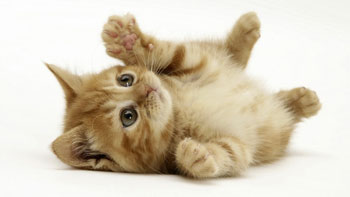
The stomach's various functions display a wonderful balance. Digestion is accomplished by the stomach's hydrochloric acid, which is so strong that it can both digest food and decompose the stomach's lining. But Allah created the perfect solution for this: The stomach's walls are completely covered by the mucus secreted during digestion, which protects the stomach against the acid's corrosive quality. However, there is a perfect harmony between this digestive acid and the protective mucus. When the stomach is empty, the secretion decomposes protein (meat products) and does not have its corrosive quality. When food containing protein enters the stomach, a compound secreted into the stomach turns this benign substance into a powerful decomposer of protein. So, when the stomach is empty, this powerful protein decomposer does not harm the stomach, which is made up of protein. This is an extraordinary example of how Allah protects human beings.
Breathing depends on delicate balances. If we breathe cold or dirty air, our health may be adversely affected. Our noses have been created to warm and purify this air. For example, its hairs and inner sticky material catches dust from the air and filters it, and its curves warm the air. The bones inside the nose are created in such a way that air passing through it is warmed up before entering the lungs. The fact that air is directed to the lungs by such an intricate system is proof that Allah, in His mercy, created both systems. As a result, we breathe warm, moist, and purified air. The delicate adjustment of the atmosphere and the perfect design of all the aspects of our nose have been specially created. We can see Allah's protection and His mercy and compassion for human beings in every detail.
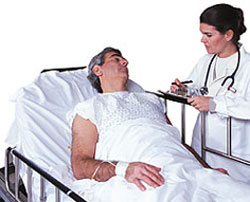
The human body can be weakened by many influences. This weakness provides an opportunity for us to think about life's transitory nature.
Your survival depends upon the amount of sugar in your body remaining between certain limits. When you eat food containing sugar, the necessary calculations are done automatically. For example, when the amount of sugar in our blood rises, the pancreas secretes insulin, which commands the liver and other bodily cells to recover and store the excess sugar so that it will not reach dangerous levels. Besides controlling these things, your pancreas, insulin, and liver maintain this balance. If two containers of blood with different sugar levels were placed in front of you, could one determine the difference between them without the presence of a laboratory and advanced instruments? However, Allah has made such an analysis automatic, for certain cells measure the blood's sugar level more precisely than any laboratory could do and then take the appropriate measures: locate the sugar in the blood, separate it, and burn it. This is an incomparable protective system, because too much sugar in the blood could be fatal.
The skeleton, the body's structural support, is a wonder of engineering. It protects the body's essential organs (e.g., the brain, heart, and lungs) and enables movement far beyond the ability of any artificial machine. Its bones have a superior structure. For example, the thigh bone, when standing upright, can lift a ton. And at every step, a weight equal to three times the body's weight is put on this bone. When a pole-vaulter lands on the ground, his or her thigh bone is subjected to a pressure of 1,400 kilos (3,086 pound) per square centimeter. What makes this bone, the result of a single cell's division, so strong? The answer is hidden in its incomparable creation, which makes bones extremely strong and light enough to be managed. Otherwise, if each bone was strong inside and out and not hollow, it would be too heavy for a person to carry, and its structure would be so hard and brittle that it would break at the slightest trauma. This wonderful creation allows us to live very comfortably and make difficult movements without pain.
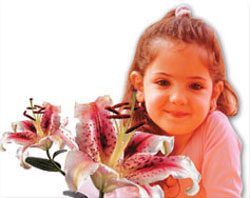
If we could not smell, we could take no pleasure from our food or drink or know what a lovely scent was. We are aware of this important blessing because the All- Merciful and Most Merciful has enabled us to smell.
Another characteristic of the bones' structure is that they are flexible wherever flexibility is required. For example, the rib cage protects the heart and the lungs and expands and contracts to allow the lungs to breathe. This flexibility can change with time, such as when a woman's pelvic bones become loose and separate from each other in the last months of pregnancy. This is very important, because it allows the baby's head to come out without being crushed. The skeleton's capacity for movement is a manifestation of Allah's endless compassion.
At every step we take, the vertebrae that make up our spinal column move on top of one another. This continual movement and friction could cause the vertebrae to wear away. However, this is prevented by the resilient cartilage (disks) located between them to serve as shock absorbers. Moreover, every step sends a reactive force, due to the body's weight, from the ground to the body. This force does not harm the body, because these shock absorbers and their folded force-dispersing shape do not allow the force from the ground to be carried directly to the brain. As a result, the top of the spinal cord cannot break through the skull and pierce the brain.
All of these details are proof of Allah's wondrous creation. Allah loves all people and so manifests His pity and mercy to them. Every blessing and perfect design He creates are designed to give us comfort. Also, He has created human beings in an aesthetically beautiful way. Even looking at the human body from the outside reveals His perfect artistry. It says in Surah Ghafir:
Allah made Earth a stable home for you and the sky a dome; and formed you, giving you the best of forms; and provided you with good and wholesome things. That is Allah, your Lord. Blessed be Allah, the Lord of all the worlds. (Surah Ghafir, 64)
The joints that attach the bones to each other are also great miracles. Although they move as long as the person is alive, they do not need to be lubricated, for the surfaces where they receive friction are covered with a thin, porous layer of cartilage below which is a dark, slippery fluid. If part of the joint is under pressure, the fluid squirts from the pores, making the joint's surface as slippery as oil. Therefore, human beings can perform many actions quickly and comfortably. What if our leg consisted only of one bone? Walking would certainly be a major problem, and our bodies would be extremely clumsy and slow-moving. It would even be hard for us to sit down, and the danger of breaking a leg because of the strain of such movements would be constant. However, our skeleton allows the body to move with ease, truly a great mercy. Allah reveals in the Qur'an as follows:
Look at the bones – how We raise them up and clothe them in flesh. (Surat al-Baqara, 259)
Think of a long piece of tissue. It has the ability to become warm or cool, is strong but beautiful, and can protect what it covers against every kind of external influence. Our skin has all of these characteristics. If just one part of it is damaged, we may die because of significant water loss. If we remove one centimeter (0.3 inch) of skin, we will see underneath it is something not so pleasing to look at: fats, proteins, and blood vessels. The skin, covering up all of these unsightly things, contributes an important aesthetic quality to our bodies as well as protecting us from all external influences.
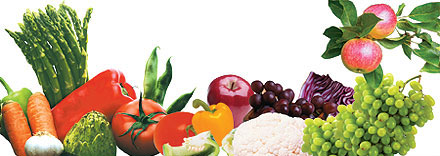
By creating our skin, Allah gave us a beautiful appearance and, because of its underlying material, allowed us to be aware of our vulnerability. Skin is more important than ears, nose, or eyes. We can live without the other sense organs, but we cannot survive without skin, for without skin, the body could not retain the water that forms a significant part of our body.
The skin is resilient and flexible. While a significant number of cells on its upper layer are dead, those on its lower layer are alive. The former soon begin to lose their character as cells and turn into keratin, a hard substance that holds dead cells together and enables them to form a protective armor for the body. You might think that if the skin were harder and thicker, its protective qualities would increase. But this is not the case. If our skin was as thick as that of elephants or rhinoceroses, our bodies would be able to move only with great difficulty. If the cells in the skin's upper layer were constantly dying, our skin would continue to thicken until it became too thick. But this never occurs; the skin is always just as thick as it needs to be. The cells that make up skin tissue cannot decide when to stop, nor can this whole system have come into being by chance. There is an obvious design in its structure, and its designer is Allah.
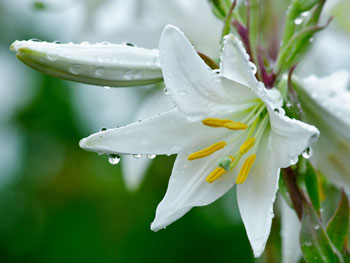
The skin contains mechanisms that enable it to cool down in hot weather. In cold weather, it maintains the body's heat by slowing down its sweat glands and narrowing its blood vessels. This decreased blood flow prevents the body's heat from escaping. The skin both protects us and acts as a climate-control device and, because of its elasticity, enables us to move easily. Besides, it is very aesthetic. Our skin could have been hard, thick, and course; or so inelastic that it could have split when we put on a bit of weight; or could have caused us to faint in the summer and freeze in the winter. But He covered us in the most comfortable, convenient, and aesthetic way, for "He is Allah—the Creator, the Maker, the Giver of Form" (Surat al-Hashr, 24).
The most important part of our body is surely the heart. Its creation, based on extremely delicate balances, consists of four chambers that pump blood throughout the body without mixing purified and non-purified blood and contains small safety valves. Our heart always beats at a certain tempo—an obvious proof of His name the All-Merciful and Most Merciful. It begins to beat while the embryo is still in the mother's womb, and beats at a rate of 70-100 beats per minute (about 10,000 times per day) until the person dies, with only a half-a-second wait between beats. All of its elements function in a very delicate way. Every detail (e.g., pure blood being separated from impure blood, blood pressure, delivering nutrients to the body) was created for a specific function and designed accordingly. Located in the rib cage, it is well-protected from external trauma.

The amount of blood pumped changes according to the body's needs. Under normal conditions, the heart beats 70 times a minute. Our muscles need more oxygen during times of intense exercise, and so the heart rate goes up to 180 and the amount of blood pumped increases. If this did not happen, the body's balances would break down and damage would occur. However, without any intervention on our part, the heart itself adjusts the amount of blood to be pumped.
A special nerve system controls the amount of blood to be pumped and adjusts both the amount and the rate at which it must be pumped. The heart's elements, also without our intervention, adjust how much blood is needed and where and when it is needed. Since the heart could not form itself, and since this wonderful system could not have come into being by chance, the heart must have been created. Allah, in His eternal knowledge, is responsible for this amazing creation and uses it to display His flawless artistry. The fact that such subtlety, order, and perfection could come together in one plan is a sign of His love and compassion.
Our hands do normal things like stirring tea, turning pages, and writing. But these are really wonders of engineering. The hand, a perfect proof of creation, has several different functions. For example, when clenched into a fist it can hit any object with a force of 45 kilograms (99 pounds); at the same time, it can sense a piece of paper one tenth of a millimeter thick when held between the thumb and the index finger. We can see that these two functions are totally different from each other: the first requires delicacy, while the second requires great force. But when we pick up a sheet of paper or hit something with our fist, we do not consider how to perform these functions or adjust the needed force. The hand has been created to do all of these things at the same time. All of its fingers, which are proportionate to one another, have the correct length and location to perform their functions.
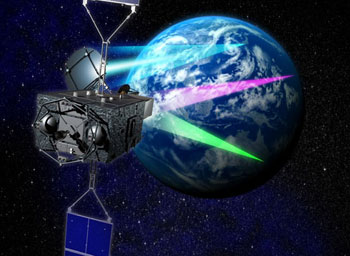
For example, the force behind the blow of a fist with a normal thumb differs from the blow of a fist with a short thumb, for the thumb with the appropriate length can fold over the other fingers, support them, and increase their force. And when we add the fact that hands can work together in perfect harmony, we can see its perfected creation more clearly. Allah created our pair of hands to show us the incomparable perfection of His creative artistry. The universe's perfect creation is found at its highest level in the human body, every detail of which is a perfect proof of His name the All-Merciful and Most Merciful.
Blood flows in a network of vessels resembling an immense river that flows to every part of the body, carrying packets of material that the cells need to function properly: food, water, and chemical material. The package that needs to be delivered most urgently is oxygen, because cells die very quickly without it. We cannot feel or see this river flowing through our body, from the outside, for the two millimeters (0.07 inches) of skin covering the body hides them masterfully. But despite this, the skin can easily be cut and allow the underlying blood to escape. If the blood vessels were not covered by the thin and aesthetic skin, even the face of most beautiful person would be too ugly and repulsive to look at. This esthetical appearance is a wonderful grace from Allah the All-Merciful.
The most miraculous quality of blood is its ability to clot, which minimize the loss of blood due to an injury. Scientists have pointed to this clotting mechanism as an example of a perfect plan and creation, for all of the involved proteins, enzymes, and vitamins go about their tasks in perfect order. The body bleeds when it receives the occasional scratch or cut. Normally, we would expect the blood to flow out of such a cut; instead, it clots and plugs up the opening. This operation is like the repairing and stopping up of a hole in the bottom of a bottle so that the water will not run out. This is certainly a great miracle, for it enables people to go on living.
Allah, in His endless mercy and compassion, protects people by this wonderful process. Clotting is the result of many enzymes coming together. Composed of proteins and different kinds of lifeless, unconscious, and blind atoms, every one of them starts to function whenever a wound occurs by organizing themselves to stop the flow of blood. For examples, they produce the required proteins as medicine and send messages to others for help; the others understand the message, immediately go to place indicated, and perform their duties perfectly. The system works flawlessly. If the blood started to clot without a wound, or if the clot left its place around a wound, or if there was a breakdown of communication between the proteins involved … if any of these things happened, the way to the body's vital organs would be stopped up and death would occur through blood loss.
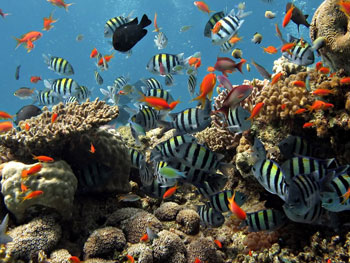
Blood clotting is not limited to visible wounds, for it also repairs the many tears that happen every day unnoticed by us in capillary vessels. When we hit a table with our leg, many capillary vessels are ripped and internal bleeding occurs. However, the clotting system stops this bleeding immediately and repairs the damage from inside. Without this clotting system, all of us would have hemophilia and would, in the advanced stages of this disease, be unable to stop even a small wound from bleeding. In other words, we would be in constant danger of bleeding to death. Every detail of this clotting system is a product of a separate plan and creation; a demonstration of Allah's eternal knowledge, intelligence, and power.
The human body is surrounded by several dangerous enemies: bacteria, viruses, and similar microscopic creatures found in the air and water, as well as our food and environment. But Allah has created for each body a wonderful protective system. For example, the keratin in the cells located on the skin's outer surface effectively prevents any foreign elements, such as bacteria and fungus, to penetrate the skin. In addition, this layer continually sheds and is replaced by new skin from below. So, any unwanted microorganisms that seep between the skin layers are removed along with the dead skin. These enemies can enter the skin only through a wound.
Viruses can enter the body through the air, but a special secretion in the nose's mucus and the lungs' protective cell-eating elements (phagocytes) is usually able to deal with such situations before the danger increases. The majority of germs that enter the body through food are destroyed by acid in the stomach and tiny digestive enzymes in the intestines. All of these defense mechanisms are created with a superior system that also fights against its enemies by a Creator with superior knowledge and power. This Creator, Who protects people from any hardship and difficulty with His endless mercy and compassion is Allah, the All-Merciful.
Breathing, eating, and walking are quite normal activities. However, most of us never wonder how these vital activities happen. For example, we do not think about how certain foods benefit our bodies or that vitamins and proteins separate from each other and go to the organ where they belong, in what proportion they will mix with our blood, or the exact amount required. When we think we want to eat something good, a vast and extremely complex network in our body starts to perform the necessary work for us, by Allah's inspiration, in order to separate the harmful from the beneficial, and to use what is beneficial and expel what is harmful or unnecessary. All of this is an important sign of Allah's love, mercy, and compassion, for we do not have to think about it. It simply occurs, as that was how He created each system.
Pain is a mercy from Allah. Many people are not aware that this is a blessing, for they never consider that pain makes them aware that something is wrong in their body and that they should go to the doctor. If there were no pain, how would people know that they have stomach problems or kidney stones? If this were not known, the illness would remain unknown until it intensified and somehow became noticeable. But, in His mercy, Allah makes people feel the symptoms of every illness, thereby enabling them to be diagnosed in advance.
The sense of smell is an incomparable manifestation of Allah as the All-Merciful and Most Merciful. Such smells as those that belong to roses, carnations, lilacs, jasmine, lavender, grass, spring flowers, orange, tangerine and lemon blossoms, various aromas, spices, toast, tea and coffee at breakfast, meat cooking on the grill, or the clean smell of soap are blessings from His endless generosity. What we define as smell is actually molecules that are released from objects. For example, what we perceive as the smell of freshly ground coffee is actually the pleasant aroma of airborne molecules carrying the coffee's smell. The more intensely molecules are given off, the stronger the smell is. The reason a cake cooking in the oven smells more than a stale cake is because it releases more particles into the surrounding environment, since heat allows the molecules of smell to move freely and spread over a wide area. At this point, we should take note of the order and delicate balances in human life. Some things have no smell, such as stones, steel, and glass, because they do not give off molecules at room temperature. If everything in your room had a smell, you would be rather uncomfortable. Another interesting and important fact is that water, even though it evaporates at low temperatures, has no smell. So, there would be no difference between a dry rose and one that had been recently watered and still had drops of water on it. In other words, the rose's natural scent would not be destroyed. And the water vapor in the air would make the smell stronger. For example, water molecules that evaporate after a rainfall raise particles of smell from flowers into the air and help these pleasant scents permeate the surroundings.
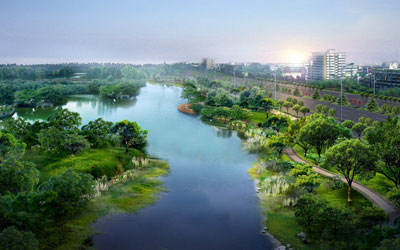
The variety of smells is a wonderful gift from Allah. It is still unknown how many scents exist in nature, for we can never know the number of different molecules. Attempts have been made to categorize scents, but there is such an extraordinary variety of smells that no satisfactory grouping has ever emerged. Allah, Who created this world's blessings to satisfy our needs and Who created these things to benefit us, created them to speak to our spirits and give us pleasure. The magnificent aromas of food and plants are proofs of His compassion. A pleasant smell is not a necessity; rather, it is something beautiful that pleases human beings and their spirits. Allah's goodness is great, His generosity is limitless, and He offers good things to humanity.
The characteristics of different smells come from the microscopic differences in molecules. For example, the difference between a freshly cooked egg and a rotten egg is the difference in the structure of the particles they spread in the air. The differences between molecules' chemical structures depend on very delicate distinctions. So, just changing one carbon atom could make a pleasant smell repulsive. The creation at every point in the universe is also noticeable in the structure of molecules of smell. The particular aromas of cacao, lavender, flowers, and strawberries come from the atoms that produce the smell molecules and the special ordering of the relation among them. Every molecule has been planned to fulfill its special purpose. Certainly, this wondrous plan belongs to Allah, for "He created everything and determined it most exactly" (Surat al-Furqan, 2). And all of these details have been created so that people can take greater pleasure in His blessings, which in itself is a grace from His eternal generosity.
There is a very delicate balance between smells and our pleasure. We enjoy the smells of things that are good for us, but are repelled by the smell of things that are harmful for us. The smells coming from food that is good for our bodies awake in us a sense of pleasure and arouse our interest. When we are hungry, the smell of cooking food makes us want to eat. So, we take pleasure in eating and also fulfill our bodily needs. Again, while our bodies are busy digesting the food and feel no need for more food, the smell of food is not very attractive to us. The smells we describe as bad usually come from things that are harmful to us. We can easily identify poisonous chemicals from their bad smell. Also, bad smells due to bacterial infections, such as rotten fruit or spoiled food, warn us not to eat them. The heavy smell spread around by a rotten fruit or spoiled food warns people of the danger.
Such delicate balances are also evident in the sense of smell, which is ordered to fulfill every creature's needs. Let's take a human being as an example. If our sense of smell were weaker, we could not be aware of some dangerous situations. If it were as strong as a dog's, our attention would be distracted every moment and we would be very uncomfortable. These balances can be seen in each molecule's structure. For example, a pleasant smell is not pleasing if it is too overpowering. Many plants have very pleasant smells, but a strong essence made from them does not please us. This shows that their scents have been created to please human beings as a blessing from the All-Merciful and Most Merciful, Who created the attractive scents in the plants we need for food. His generosity and grace are without limit, and in His endless compassion and mercy, He has made us like what is good for us and dislike those which are bad for us. We should thank Him for these blessings, instead of taking them for granted. If Allah do desires, those who do this, will have forever the real blessings of Paradise. However, those who are ungrateful enough to deny Allah's blessings will live forever without them in Hell.
The sense of taste is one of His incomparable blessings. Besides the wonderful tastes of such foods as meats, fish, vegetables, soups, salads, pastries, sweets, savories, fruits, jams, ice cream and candied fruit, Allah has created systems in our body that allow us to distinguish their tastes. Two of these systems, the senses of taste and smell, are very important for us. We can only discover the richness of the world of taste and smell through the agency of taste and smell. Without these systems, there would be no meaning to the ideas of a delicious taste or a pleasant smell. If we could not appreciate such fine smells and tastes, we would not know what a strawberry was. We use our senses of taste and smell as soon as we are born, and perceive an infinite number of them throughout our lives because of these wonderful systems. Even more amazing is that this all happens without our conscious effort.
Of course, we must think carefully about these things, and there is no doubt that, like everything else we possess, Almighty Allah, Lord of the universe has created them. If we examine the sense of taste and smell, we see that these systems are full of amazing proofs of creation. The Qur'an speaks of the perfection in Allah's creation:
He is Allah – the Creator, the Maker, the Giver of Form. To Him belong the Most Beautiful Names. Everything in the heavens and Earth glorifies Him. He is the Almighty, the All-Wise. (Surat al-Hashr, 24)
The human body needs food and water to continue its vital functions. We meet the needs of its trillions of cells by eating and drinking so that each cell can acquire the energy it needs to function properly. We make a variety of decisions while eating: Is the food nourishing and healthy, or is it rotten and potentially dangerous? Does the food taste bitter, salty, or acidic? Does it contain the necessary mineral salts and fluids, amino acids used in the synthesis of cell protein, carbohydrates to meet our energy needs, and fats?
Moreover, we know how to maintain our health. For example, when we feel out of sorts, we choose foods rich in vitamins, minerals, and sugars. When our blood pressure drops, we eat salty foods; when it rises, we avoid such foods and beverages. Our sense of taste analyses proteins, ions, complex molecules, and many chemical compounds; it works unceasingly throughout our lives on our behalf. And, as it provides our daily nutritional needs, we enjoy the incomparable tastes of food, drink, fruit, pastry, and candied fruit. We can enjoy such wonderful things because of the sense of taste that Allah, in His endless generosity, has placed at our service. The Qur'an tells us that Allah has created good, clean food for human beings:
Allah made Earth a stable home for you and the sky a dome; formed you, giving you the best of forms; and provided you with good and wholesome things. That is Allah, your Lord. Blessed be Allah, the Lord of all the worlds. (Surah Ghafir, 64)